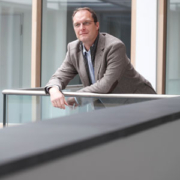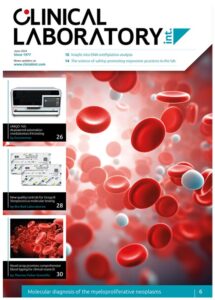For a dynamic new biomedical research centre, water-cooling is the way to go
Opened in 2011, the Institute of Molecular Biology gGmbH (IMB) at Johannes Gutenberg University, Mainz, Germany is housed in a brand new building with state-of-the-art scientific facilities. The architect suggested that ultra-low temperature freezers housed in the Institute’s Core Facilities should be capable of being linked to a central water-cooling system, an integral part of the building’s modern infrastructure.
Centre of excellence
Described as ‘a centre of excellence in the life sciences in the heart of Europe’, IMB has been funded for an initial period of ten years by the Boehringer Ingelheim Foundation, a charity dedicated to promoting outstanding research in medicine, biology, chemistry and pharmaceutical science. As a non-profit entity, which operates like an innovative academic research centre, IMB focuses on key questions in developmental biology, epigenetics and DNA repair. The aim is to transform our understanding of how we develop, adapt to our environment, age and develop diseases such as cancer.
IMB’s core facilities
Researchers at IMB have access to cutting-edge technologies and the latest equipment provided centrally. This arrangement has significant benefits, as Dr Bernhard Korn, Director of IMB Core Facilities, explains: ‘The decision to set up centralised resources comprising cost-intensive instrumentation and high-level expertise enables even small research groups at IMB to run ambitious major projects’.
‘Secondly, it is much more economical for the Institute to run instruments and equipment, such as freezers, at the limit of their capacity by sharing resources among multiple users. In addition, by locating our ULT freezers together in a dedicated area we can make use of a centralised monitoring and alarm system which constantly checks the temperature, power supply and cooling water for all units.’
Selecting ULT freezers
IMB chose to equip its core facilities with 23 SANYO MDF-U74V upright -86ºC freezers and three of the company’s MDF-C2156VAN cryogenic freezers. All are equipped with the water-cooled condenser option, to meet a requirement to utilise the Institute’s water-cooling system. The space-saving -86ºC freezers are used to hold a collection of more than 25,000 different human protein-coding clones, while the -150ºC freezers store a large number of human cell lines, tumour cell lines and tissue samples. Later, patient specimens will also be stored prior to the extraction of nucleic acids and proteins.
According to Bernhard Korn, ‘Installing SANYO freezers was essentially a ‘plug-and-play’ experience for us. The freezers arrived, they were hooked up to the cooling water, switched on and they worked. They provide a very stable, constant environment with no temperature fluctuation – this is what we really love about them. The insulated inner doors on the MDF-U74 model reduce temperature change when the freezer is opened and there is enough space for large boxes. A wide choice of shelves provides the flexibility to accommodate the storage needs of our different research groups. These freezers are very easy to operate and we like the fact that the main power switch is on the side. This means there is no danger of a unit being turned off accidentally – a recognised hazard if this switch is placed on the front panel.’
Advantages of water-cooling
The architect of the IMB building suggested that wherever possible, equipment should be water-cooled, rather than relying on traditional air cooling. So, in addition to ULT freezers, there are centrifuges, laser systems and sterile work benches which are also connected to the building’s central water-cooling system.
As Dr Korn points out, there are various advantages to water-cooling freezers, ‘With less heat dissipated in the freezer room only ventilation is needed, rather than air-conditioning that not only requires energy but wastes heat. In fact with a total of over 100 instruments throughout the Institute hooked up to the water-cooling system, only a very few labs and measurement rooms, around five per cent of the total space, require active cooling.
‘Water is circulated at 18ºC and leaves the freezers at 23–24ºC. However, this heat energy is not wasted as the warmed water is used to contribute to the central heating for the whole building. Therefore the Institute is able to reduce energy costs and benefit the environment.’
SANYO’s water-cooled ULT freezers incorporate a double plate heat exchanger which maximises energy transfer from the refrigerant to a closed water circuit. As water is more efficient than air at removing heat, the compressor efficiency is improved. As a result, not only is energy consumption 15–20 per cent lower than for an equivalent air-cooled model, but temperature recovery after door opening and sample loading is faster, protecting samples.
Further developments at IMB
2012 will see IMB expanding to its full complement of around 12 groups, with the core facilities being extended to support the additional researchers. The success of the current water-cooled ULT freezers is underlined by plans to add five or six more of the same -150ºC freezers and up to ten of the -86ºC models, all with water-cooled condensers.
Dr Korn commented, ‘SANYO is well known not only for the quality and reliability of its ULT freezers, but also for building good customer relationships and providing excellent technical support. Another important factor for IMB is the high level of service and full guarantee provided by EWALD Innovationstechnik GmbH, the German distributor. Although initially more expensive than equivalent air-cooled freezers, choosing the water-cooled condenser option enables the Institute to use less energy and make significant savings in the medium and long term. We believe this is the way to go for the future.’
Institute of Molecular Biology GmbH
funded by the Boehringer Ingelheim Foundation
Ackermannweg 4
55128 Mainz
Tel: +49-6131-39-21501
www.imb-mainz.de
SANYO E&E Europe BV
Biomedical Division
Tel. +44 (0) 1509 265265
www.eu.sanyo.com/biomedical



